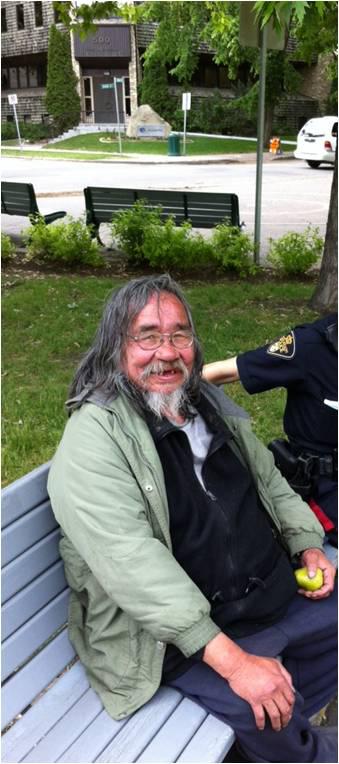Crime is Slate’s crime blog. Like us on Facebook, and follow us on Twitter @slatecrime.
In America, homeless drunks are routinely ignored, or despised, or given one-way bus tickets out of town. In kind-hearted Canada, homeless drunks become local celebrities. Chris Purdy of the Canadian Press wire service has a great story today about a homeless alcoholic named Alvin Cote who died last month at the age of 59. Cote befriended most of the cops on the Saskatoon police force, largely because he interacted with them so often. “It’s believed Cote had been arrested more times for public drunkenness than anyone else in the city’s history,” writes Purdy. In February, Saskatoon’s Star Phoenix reported that Cote had racked up 843 public drunkenness arrests.
If you spend that much time in the company of police officers, you are bound to develop a personal relationship. Saskatoon cops took to Cote, despite the fact that he was often belligerent, or perhaps because of that fact. (His catchphrase was “I’m a fighter.”) “Cote was such a character that a worker at the police detention centre sketched his picture, put his mug on some T-shirts and gave them to other staff,” writes Purdy. “Orders for more are now rolling in so people will have something to remember him by.”
My first thought after reading this story was that it’s always good to hear about the human side of police work. Purdy writes about officers buying Cote food, celebrating his birthday, and giving him free eyeglasses “from boxes of used, donated pairs that were supposed to go to Africa.” One time, Cote raised hell because officers gave him a free magazine with a cover that featured the singer Anne Murray, whom he despised. It’s like a Canadian version of The Andy Griffith Show, with Cote playing the part of Otis Campbell.
But real life isn’t as hilarious as fiction. While the 1986 TV movie Return to Mayberry revealed that Otis the town drunk had gone sober and found work as an ice cream vendor, a happy ending was never really an option for Cote. The February Star Phoenix profile noted that Cote was physically and sexually abused as a child; that he suffered from brain damage after falling down a flight of stairs years ago; that his family was unequipped to deal with his frequent drunken rages. Cote spent his days begging for change to get his fix of vodka and mouthwash; he spent his nights passed out in various alcoves across the city, or in the Saskatoon Police drunk tank, his shelter of last resort:
Even though exact numbers are impossible to calculate, every year Alvin costs taxpayers at least hundreds of thousands of dollars. Aside from medical bills and regular ambulance rides, he is also a drain on police resources. He takes up hours of police time every week. He’s been kicked out of almost every shelter in the city—more often than not because he refuses to stop drinking. The police are the ones who end up taking him in.
Locking a guy up over and over again seems like a really inefficient way of addressing a serious alcohol problem. Purdy reports that Saskatoon hopes to build a treatment center, to be used as an alternative to incarceration for the city’s substance addicts. But, as the city’s police chief notes, it can be hard to help someone who doesn’t want to be helped. In situations like those, all you can do is offer empathy and kindness.
One officer who eulogized Cote on the official blog of the Saskatoon Police told Purdy “he had a good cry after writing the online tribute.” That tribute is well worth reading. “Alvin was not a rich or well accomplished man. He drank daily and chose to make the street his home, but he was tough, he was a fighter, and he was a survivor,” wrote Constable Derek Chesney. “It brings a tear to my eye to think of the bad things that happened to Alvin in his past to push him to lead the life that he led, but in that, I do hope that he will find peace wherever he now may be.”
(H/T @jana_pruden)
